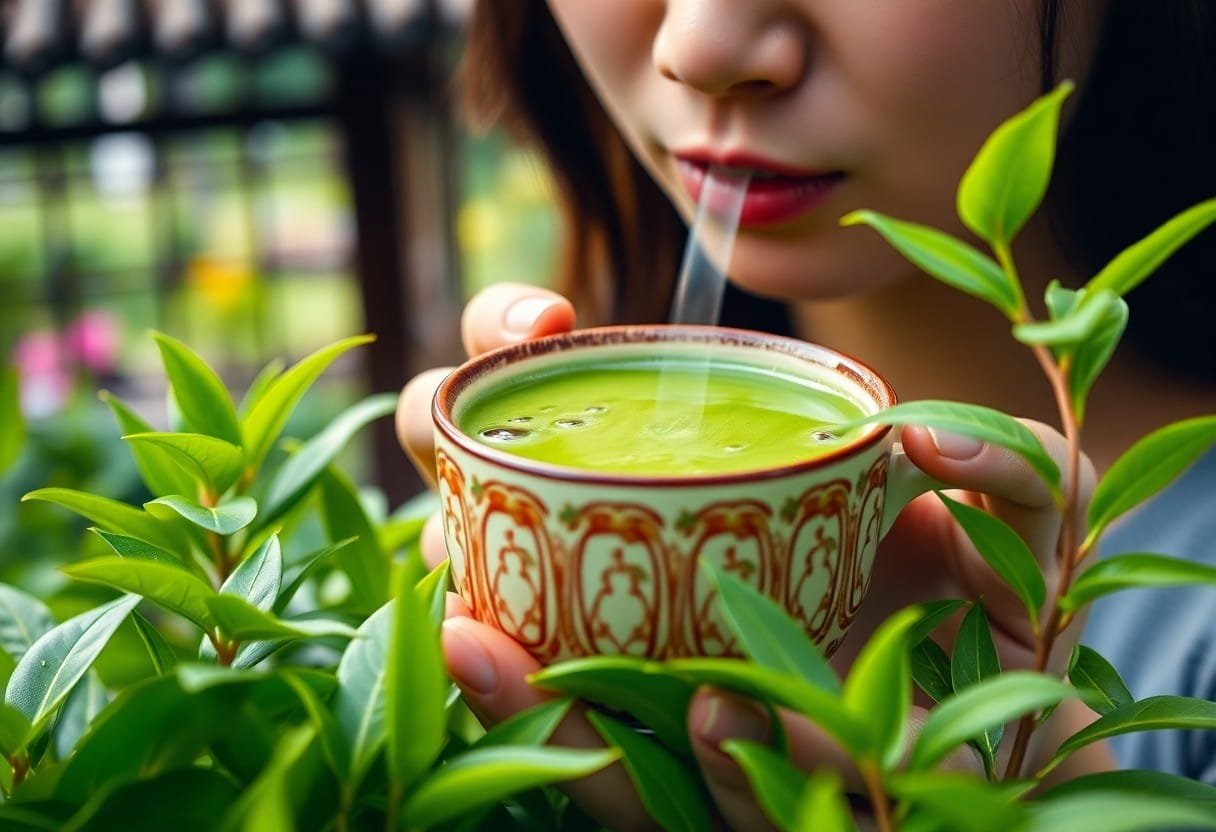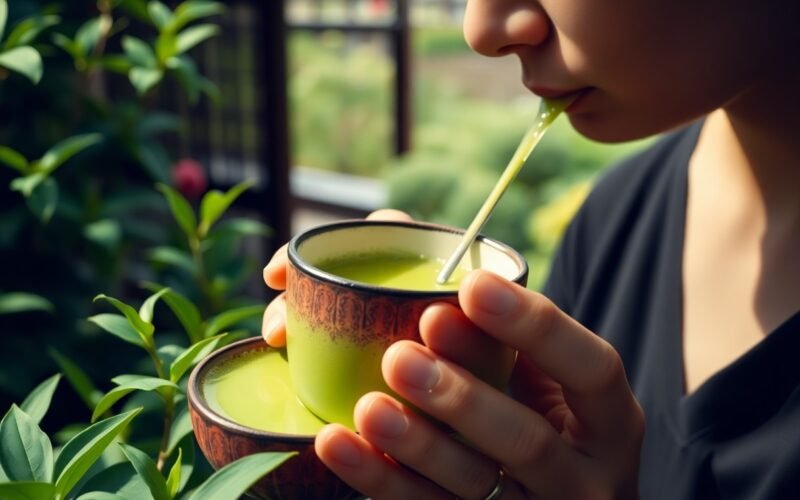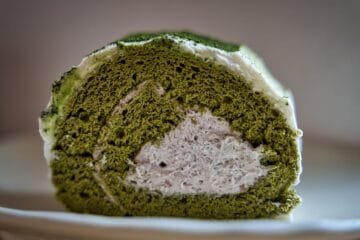Over time, incorporating matcha into your daily routine can lead to significant changes in your body and overall health. This vibrant green powder, packed with antioxidants and energy-boosting properties, may help improve your metabolism, enhance focus, and even promote relaxation. However, consuming matcha in excess could lead to potential side effects like insomnia or digestive issues. In this post, we’ll explore the benefits and risks of Drinking matcha daily, helping you understand what to expect for your health and well-being.
Key Takeaways:
- Daily consumption of matcha can enhance your metabolism and support weight management due to its high levels of catechins and antioxidants.
- The presence of L-theanine in matcha promotes calmness and focus while potentially reducing stress and anxiety levels.
- Regular intake of matcha may improve skin health and protect against signs of aging due to its powerful antioxidant properties.
Antioxidant Powerhouse: Matcha’s Unique Chemical Composition
Rich in antioxidants, matcha boasts a unique chemical composition that sets it apart from other teas. The vibrant green color of matcha comes primarily from high concentrations of chlorophyll and polyphenols. These compounds work synergistically to combat oxidative stress, support cell health, and enhance your overall well-being. Drinking matcha daily can provide a potent dose of these antioxidants, helping to mitigate the effects of free radicals in your body.
The Role of Catechins in Health
Catechins are the key players in matcha’s health benefits, particularly epigallocatechin gallate (EGCG), which is known for its powerful anti-inflammatory and antibacterial properties. Consuming matcha daily can contribute to better heart health, weight management, and even improved brain function. Studies suggest that these catechins may also support metabolic processes, allowing you to maintain a healthy weight and enhance your energy levels more effectively.
Comparison of Matcha and Traditional Green Tea
While both matcha and traditional green tea originate from the Camellia sinensis plant, their differences lie in their cultivation, processing, and nutritional profiles. Matcha involves consuming the whole leaf, offering a higher concentration of nutrients compared to steeping green tea leaves in water. This difference results in significantly enhanced levels of caffeine, L-theanine, and antioxidants in matcha, making it a more potent option for health enthusiasts.
Comparison Details
| Aspect | Matcha |
|---|---|
| Catechins Content | Higher concentration of catechins, particularly EGCG |
| Caffeine Level | More caffeine for sustained energy |
| Preparation Method | Whole leaf powder consumed |
| Flavor Profile | Umami-rich, creamier texture |
Both beverages have their merits, but matcha’s unique processing allows you to ingest nutrients in a more concentrated form. The higher levels of catechins and caffeine can lead to increased energy, greater mental clarity, and promoted overall health. In contrast, traditional green tea offers its own health benefits, but lacks the same intensity of nutrients that matcha provides, making it less impactful for daily health optimization.
The Metabolic Boost: How Matcha Affects Fat Burning
Daily consumption of matcha can enhance your body’s ability to burn fat effectively. Rich in catechins, particularly the powerful EGCG (epigallocatechin gallate), matcha significantly boosts your metabolism. Research suggests that drinking matcha can increase your calorie burn by up to 4% over a 24-hour period, thanks to this thermogenic effect. This means that with consistent consumption, you’ll not only feel more energized but may also see improvement in your body composition over time.
Thermogenic Properties Explained
Matcha’s thermogenic properties make it an excellent choice for enhancing your fat-burning potential. The catechins found in matcha stimulate your metabolism, promoting increased energy expenditure even at rest. This results in a greater number of calories burned throughout the day, contributing to weight loss and fat reduction.
Synergy with a Balanced Diet
Incorporating matcha into a balanced diet amplifies its fat-burning effects. While matcha boosts metabolism, it should work hand-in-hand with a nutritious diet and regular exercise to yield the best results. When coupled with healthy foods rich in fiber, protein, and good fats, matcha enhances your body’s ability to utilize stored fat as energy.
A balanced diet supports the overall effectiveness of matcha, creating an environment where your metabolism thrives. For optimal results, consider pairing matcha with whole foods like leafy greens, lean proteins, and whole grains, which will enhance nutrient absorption and harness the full potential of matcha’s catechins. This synergy not only promotes weight management but also supports overall health and vitality, making this green tea powder a powerful ally in your daily routine.
Mental Clarity and Focus: The Cognitive Enhancements of Daily Matcha Consumption
Engaging with matcha daily significantly boosts your mental clarity and focus. This vibrant green tea isn’t just a beverage; it’s a tool for cognitive enhancement. Unlike regular tea or coffee, matcha releases its caffeine more gradually, helping to maintain steady energy levels and enhanced concentration throughout the day. Users often report sharper attention, quicker reaction times, and improved problem-solving skills, making it a perfect companion for demanding tasks or long study sessions.
L-Theanine’s Role in Mindfulness
L-Theanine, an amino acid found in matcha, plays a pivotal role in promoting mindfulness. It works synergistically with caffeine to foster a state of relaxed alertness, allowing you to remain focused without the jittery side effects commonly associated with caffeine consumption. This promotes a calm yet productive mindset, making daily matcha a powerful ally in enhancing your mental well-being.
Impacts on Mood and Stress Levels
Daily consumption of matcha can have significant effects on your mood and stress levels. The combination of caffeine and L-Theanine helps to stabilize your mood while simultaneously reducing feelings of anxiety. This unique blend not only increases serotonin and dopamine production but also counteracts stress hormones, providing a calming effect that enhances your overall sense of well-being.
Research supports that those who consume matcha regularly experience lower levels of stress and anxiety. Studies indicate that L-Theanine can lead to reductions in cortisol, the body’s primary stress hormone, thereby promoting relaxation. Users often find that their mood is uplifted, and they can face daily challenges with increased resilience and positivity. Integrating matcha into your routine can serve as a natural remedy for enhancing emotional balance and mental health.
Heart Health Benefits: Preventing Cardiovascular Disease through Matcha
Drinking matcha daily can significantly enhance your heart health, largely due to its rich polyphenol content, which supports healthy cardiovascular function. The antioxidants in matcha, particularly epigallocatechin gallate (EGCG), have demonstrated potential in reducing the risk of heart disease. By incorporating matcha into your diet, you may experience lower cholesterol levels and better overall heart health over time.
Cholesterol Management and Blood Pressure Regulation
Regular consumption of matcha is linked to improved cholesterol management, as it helps lower levels of LDL (bad) cholesterol while raising HDL (good) cholesterol levels. Additionally, the bioactive compounds in matcha may assist in regulating blood pressure, helping to maintain a healthy cardiovascular system. Studies suggest that daily matcha intake can lead to a significant reduction in hypertension, making it a beneficial addition to your heart health regimen.
The Anti-inflammatory Effects of Regular Consumption
The anti-inflammatory properties of matcha can greatly benefit your cardiovascular health. Inflammation is a major contributor to heart disease, and incorporating matcha into your daily routine helps combat these effects. Research has shown that the antioxidants present in matcha, especially EGCG, can inhibit the production of inflammatory markers in the body, reducing the risk of chronic inflammation that leads to cardiovascular dysfunction.
Further studies illustrate that individuals who consume matcha regularly have lower levels of inflammatory cytokines in their system. This reduction not only aids in minimizing arterial stiffness but also enhances overall heart function. For example, an analysis demonstrated that participants drinking matcha experienced a marked decrease in C-reactive protein levels, a known biomarker of systemic inflammation. By making matcha a daily staple, you’re proactively working towards a healthier, more resilient cardiovascular system.

Practical Guidelines for Incorporating Matcha into Your Daily Routine
Integrating matcha into your daily regimen can be both enjoyable and beneficial. You can simply start your day with a cup of matcha tea, or add it to smoothies, oatmeal, or baking recipes for an extra nutritional boost. For more on the Health Benefits of Matcha, explore various ways to leverage this superfood throughout your day.
Recommended Daily Intake and Best Practices
To maximize the health benefits of matcha, aim for about 1 to 2 teaspoons (approximately 2 to 4 grams) daily. This amount is generally safe and provides a good balance of caffeine and antioxidants without overdoing it. Pay attention to how your body responds, especially if you’re sensitive to caffeine, and adjust accordingly. Consistently pairing matcha with a balanced diet and hydration will further enhance its positive effects.
Creative Ways to Enjoy Matcha Beyond the Cup
Matcha isn’t just for tea enthusiasts; its versatility allows you to incorporate it into various meals and snacks. Consider adding matcha powder to your smoothies, energy balls, or even salad dressings. You can also try matcha-infused baked goods like cookies and muffins for a flavorful twist.
Using matcha powder creatively can transform your meals while reaping its health benefits. For example, matcha can elevate the nutritional profile of your morning smoothie, providing a boost of energy and antioxidants. You might experiment with matcha pancakes, using it in your favorite batter for an eye-catching green hue and a unique flavor. Even savory dishes can benefit; just sprinkle some matcha over roasted vegetables to add a hint of earthiness. The opportunities are endless, ensuring you don’t just enjoy matcha in a cup, but rather as a delicious addition to your culinary repertoire.
Summing up
Ultimately, incorporating matcha into your daily routine can lead to enhanced energy, improved focus, and numerous health benefits from its rich antioxidant content. As you enjoy this vibrant green tea, you may also experience a calm alertness due to its unique combination of caffeine and L-theanine. However, it’s important to moderate your intake to avoid potential side effects. For further insights on consumption limits, check out Is drinking too much Matcha a bad thing? : r/tea.
Q: What are the potential health benefits of drinking matcha daily?
A: Drinking matcha daily can provide a number of health benefits. It is rich in antioxidants, which can help combat oxidative stress and promote overall wellness. The unique combination of caffeine and L-theanine found in matcha may enhance focus and alertness without the jitters associated with coffee. Additionally, its high chlorophyll content supports detoxification, and it may aid in weight management by boosting metabolism. Regular consumption is also linked to improved heart health and may reduce the risk of chronic diseases.
Q: How does daily matcha consumption affect energy levels?
A: Consuming matcha daily can lead to increased energy levels due to its caffeine content combined with L-theanine. Unlike coffee, which can cause spikes and crashes in energy, matcha offers a more sustained energy release. This results in improved endurance and alertness without leading to the typical jitters or crashes post-consumption. Many matcha drinkers report feeling more focused and productive throughout the day, making it an effective beverage for those needing a mental and physical boost.
Q: Are there any side effects associated with drinking matcha every day?
A: While matcha is generally safe for daily consumption, excessive intake may lead to side effects such as insomnia, headaches, or digestive issues due to its caffeine content. Individuals sensitive to caffeine should monitor their intake and consider limiting their consumption to avoid adverse effects. Additionally, consuming matcha in moderation is advisable, as high doses can increase the risk of liver toxicity from the high levels of certain compounds found in green tea. Consulting with a healthcare professional before incorporating matcha into a daily routine is recommended.




